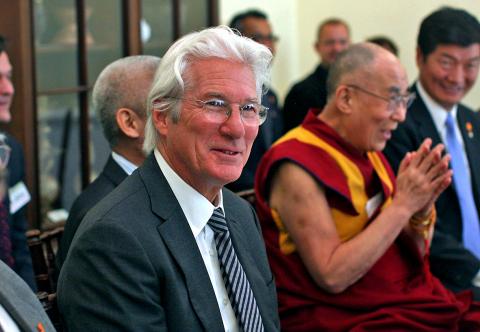US President Barack Obama met with the Dalai Lama at the White House yesterday, despite Beijing warning that Obama hosting the exiled Tibetan spiritual leader could damage mutual trust.
Obama has met the Dalai Lama several times before and calls the monk, who is revered by Tibetans, but portrayed by Beijing as a dangerous separatist, “a good friend.”
The tete a tete — as usual — took place behind closed doors in an effort to avoid angering China, which accuses the Nobel Peace laureate of using “spiritual terrorism” to seek independence for Tibet.

Photo: AP
“The China’s foreign ministry has launched solemn representations with the US side, expressing our firm opposition to such an arrangement,” Chinese Ministry of Foreign Affairs spokesman Lu Kang (陸慷) told reporters earlier yesterday. “If such [a] meeting goes through, it will send a wrong signal to the separatist forces seeking Tibet independence and it will damage mutual trust and cooperation.”
The spiritual leader — who has lived in exile in India since a failed 1959 uprising — has for decades called for more Tibetan autonomy rather than independence.
Beijing maintains he is a “wolf in monk’s clothing” and vigorously lobbies — often successfully — against foreign leaders meeting him.
Obama made a high-profile public appearance with the Dalai Lama last year at a prayer breakfast in Washington, calling him “a powerful example of what it means to practice compassion.”
However, three prior meetings were held privately and Obama was criticized in 2010 for obliging the 80-year-old, clad in his characteristic red robes and flip flops, to leave the White House through a back door, and walk past piles of snow and bags of rubbish.
Yesterday’s meeting was held away from the cameras in the White House Map Room, not in the Oval Office.
Tibetans “feel happy about His Holiness meeting the president,” said Sonam Dagpo of the Tibetan government-in-exile, adding they hoped the US would support “the struggle of Tibetans.”
China has ruled Tibet since the 1950s, but many Tibetans say Beijing represses their Buddhist religion and culture.
More than 130 ethnic Tibetans have set themselves on fire since 2009 in protest at Beijing’s rule, campaign groups and overseas media have said.
Many observers believe China is confident that the Tibetan movement will lose much of its potency and global appeal when the charismatic Dalai Lama dies.
The Dalai Lama has also increasingly spoken of succession and has not ruled out picking his reincarnation before his death, fearing that China would instead pick its own boy whom it would use to advance its agenda.

‘ABUSE OF POWER’: Lee Chun-yi allegedly used a Control Yuan vehicle to transport his dog to a pet grooming salon and take his wife to restaurants, media reports said Control Yuan Secretary-General Lee Chun-yi (李俊俋) resigned on Sunday night, admitting that he had misused a government vehicle, as reported by the media. Control Yuan Vice President Lee Hung-chun (李鴻鈞) yesterday apologized to the public over the issue. The watchdog body would follow up on similar accusations made by the Chinese Nationalist Party (KMT) and would investigate the alleged misuse of government vehicles by three other Control Yuan members: Su Li-chiung (蘇麗瓊), Lin Yu-jung (林郁容) and Wang Jung-chang (王榮璋), Lee Hung-chun said. Lee Chun-yi in a statement apologized for using a Control Yuan vehicle to transport his dog to a

BEIJING’S ‘PAWN’: ‘We, as Chinese, should never forget our roots, history, culture,’ Want Want Holdings general manager Tsai Wang-ting said at a summit in China The Mainland Affairs Council (MAC) yesterday condemned Want Want China Times Media Group (旺旺中時媒體集團) for making comments at the Cross-Strait Chinese Culture Summit that it said have damaged Taiwan’s sovereignty, adding that it would investigate if the group had colluded with China in the matter and contravened cross-strait regulations. The council issued a statement after Want Want Holdings (旺旺集團有限公司) general manager Tsai Wang-ting (蔡旺庭), the third son of the group’s founder, Tsai Eng-meng (蔡衍明), said at the summit last week that the group originated in “Chinese Taiwan,” and has developed and prospered in “the motherland.” “We, as Chinese, should never

‘A SURVIVAL QUESTION’: US officials have been urging the opposition KMT and TPP not to block defense spending, especially the special defense budget, an official said The US plans to ramp up weapons sales to Taiwan to a level exceeding US President Donald Trump’s first term as part of an effort to deter China as it intensifies military pressure on the nation, two US officials said on condition of anonymity. If US arms sales do accelerate, it could ease worries about the extent of Trump’s commitment to Taiwan. It would also add new friction to the tense US-China relationship. The officials said they expect US approvals for weapons sales to Taiwan over the next four years to surpass those in Trump’s first term, with one of them saying

INDO-PACIFIC REGION: Royal Navy ships exercise the right of freedom of navigation, including in the Taiwan Strait and South China Sea, the UK’s Tony Radakin told a summit Freedom of navigation in the Indo-Pacific region is as important as it is in the English Channel, British Chief of the Defence Staff Admiral Tony Radakin said at a summit in Singapore on Saturday. The remark came as the British Royal Navy’s flagship aircraft carrier, the HMS Prince of Wales, is on an eight-month deployment to the Indo-Pacific region as head of an international carrier strike group. “Upholding the UN Convention on the Law of the Sea, and with it, the principles of the freedom of navigation, in this part of the world matters to us just as it matters in the